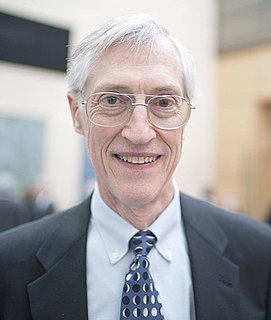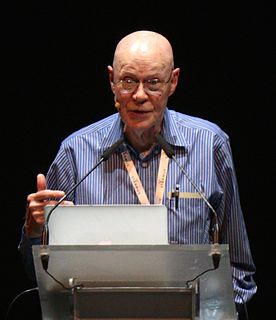A Quote by Bob Brown
We people of the Earth exist because our potential was there in the Big Bang, 13.7 billion years ago, as the universe exploded into being.
Related Quotes
If we ever establish contact with intelligent aliens living on a planet around a distant star ... They would be made of similar atoms to us. They could trace their origins back to the big bang 13.7 billion years ago, and they would share with us the universe's future. However, the surest common culture would be mathematics.
I was there when Abbe Georges Lemaître first proposed this [Big Bang] theory. ... There is no rational reason to doubt that the universe has existed indefinitely, for an infinite time. .... It is only myth that attempts to say how the universe came to be, either four thousand or twenty billion years ago.
I think the Bible is completely inspired by God in its overall messages. But, for the people of those days to know what was going to happen 4,000 years later in a world of astronomy or subatomic particles. They didn't have access to the knowledge that we presently have about geology. So, we know now that the world was created many of billions of years ago, 13 or 14 billion years ago. As far as they knew, the earth was the center of the universe. They thought that stars were little twinkling things in the sky where as now we know stars are very distant and much larger than the earth.
Ironically, members on both sides of the debate do agree about one thing: big bang cosmology puts their position in jeopardy. The big bang poses a problem for young-earth creationists because it makes the universe billions of years old rather than thousands. Such an assertion undercuts their system at its foundation. Big bang cosmology also presents a problem for atheistic scientists because it points directly to the existence of a transcendent Creator - a fact they dare not concede.
So when people ask me if I believe God created the universe, I tell them that the question itself makes no sense. Time didn't exist before the Big Bang, so there is no time for God to make the universe in. It's like asking for directions to the edge of the earth; the earth is a sphere, it doesn't have an edge, so looking for it is a futile exercise.
If we do find ET, we will at least have something in common with them. They may live on planet Zog and have seven tentacles, but they will be made of the same kinds of atoms as us. If they have eyes, they will gaze out on the same cosmos as we do. They will, like us, trace their origins back to a 'Big Bang' 13.8 billion years ago.
The atoms of our bodies are traceable to stars that manufactured them in their cores and exploded these enriched ingredients across our galaxy, billions of years ago. For this reason, we are biologically connected to every other living thing in the world. We are chemically connected to all molecules on Earth. And we are atomically connected to all atoms in the universe. We are not figuratively, but literally stardust.
Radio Astronomy has added greatly to our understanding of the structure and dynamics of the universe. The cosmic microwave background radiation, considered a relic of the explosion at the beginning of the universe some 18 billion years ago, is one of the most powerful aids in determining these features of the universe.
Our entire universe emerged from a point smaller than a single atom. Space itself exploded in a cosmic fire, launching the expansion of the universe and giving birth to all the energy and all the matter we know today. I know that sounds crazy, but there’s strong observational evidence to support the Big Bang theory. And it includes the amount of helium in the cosmos and the glow of radio waves left over from the explosion.
All indications are that three and a half billion years ago, Mars looked like Earth. It had lakes. It had rivers. It had river deltas. It had snow-capped peaks and puffy clouds and blue sky. Three and a half billion years ago, it was a happening place. The same time on Earth, that's when life started. So did life start on Mars?
































